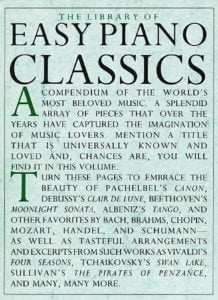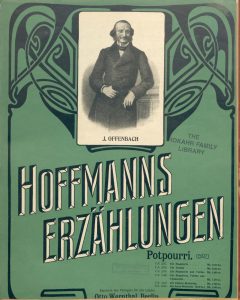Barcarole Les contes d’Hoffmann Offenbach Piano Solo sheet music, Noten, spartiti, partition, 楽譜
Come join us now, and enjoy playing your beloved music and browse through great scores of every level and styles!
Can’t find the songbook you’re looking for? Please, email us at: sheetmusiclibrarypdf@gmail.com We’d like to help you!
Best Sheet Music download from our Library.

Please, subscribe to our Library.
If you are already a subscriber, please, check our NEW SCORES’ page every month for new sheet music. THANK YOU!
About Jacques Offenbach

Jacques Offenbach (20 June 1819 – 5 October 1880) was a German-born French composer, cellist, and impresario. He is remembered for his nearly 100 operettas of the 1850s to the 1870s, and his uncompleted opera The Tales of Hoffmann. He was a powerful influence on later composers of the operetta genre, particularly Franz von Suppé, Johann Strauss II and Arthur Sullivan. His best-known works were continually revived during the 20th century, and many of his operettas continue to be staged in the 21st. The Tales of Hoffmann remain part of the standard opera repertory.
Born in Cologne, Kingdom of Prussia, the son of a synagogue cantor, Offenbach showed early musical talent. At the age of 14, he was accepted as a student at the Paris Conservatoire; he found academic study unfulfilling and left after a year, but remained in Paris. From 1835 to 1855 he earned his living as a cellist, achieving international fame, and as a conductor. His ambition, however, was to compose comic pieces for the musical theater. Finding the management of Paris’s Opéra-Comique company uninterested in staging his works, in 1855 he leased a small theater in the Champs-Élysées. There, during the next three years, he presented a series of more than two dozen of his own small-scale pieces, many of which became popular.
In 1858 Offenbach produced his first full-length operetta, Orphée aux enfers (“Orpheus in the Underworld”), with its celebrated can-can; the work was exceptionally well received and has remained his most played. During the 1860s, he produced at least eighteen full-length operettas, as well as more one-act pieces. His works from this period include La belle Hélène (1864), La Vie parisienne (1866), La Grande-Duchesse de Gérolstein (1867) and La Périchole (1868). The risqué humor (often about sexual intrigue) and mostly gentle satiric barbs in these pieces, together with Offenbach’s facility for melody, made them internationally known, and translated versions were successful in Vienna, London, elsewhere in Europe and in the US.

Offenbach became associated with the Second French Empire of Napoleon III: the emperor and his court were genially satirized in many of Offenbach’s operettas, and Napoleon personally granted him French citizenship and the Légion d’honneur.
With the outbreak of the Franco-Prussian War in 1870, and the fall of the empire, Offenbach found himself out of favor in Paris because of his imperial connections and his German birth. He remained successful in Vienna, London, and New York. He re-established himself in Paris during the 1870s, with revivals of some of his earlier favorites and a series of new works, and undertook a popular US tour. In his last years he strove to finish The Tales of Hoffmann, but died before the premiere of the opera, which has entered the standard repertory in versions completed or edited by other musicians.

Browse in the Library:
Or browse in the categories menus & download the Library Catalog PDF:
The Tales of Hoffmann
The Tales of Hoffmann (French: Les contes d’Hoffmann) is an opéra fantastique by Jacques Offenbach. The French libretto was written by Jules Barbier, based on three short stories by E. T. A. Hoffmann, who is the protagonist of the story. It was Offenbach’s final work; he died in October 1880, four months before the premiere.
Belle nuit, ô nuit d’amour
“Belle nuit, ô nuit d’amour” (“Beautiful Night, Oh Night of Love” in French, often referred to as the “Barcarolle“) is a piece from The Tales of Hoffmann (1881), Jacques Offenbach‘s final opera. A duet for soprano and mezzo-soprano, it is considered the most famous barcarolle ever written and described in the Grove Book of Operas as “one of the world’s most popular melodies.” The text, concerning the beauty of the night and of love, is by Jules Barbier.
The Barcarolle does not originate in The Tales of Hoffmann; it was written in 1864 for Offenbach’s Die Rheinnixen, where it is sung as “Komm’ zu uns” by the chorus of elves in the third act.
In Hoffmann, it appeared in the version of 1881; although the third act was cut at the premiere, the location of the second act (Antonia) was changed from Munich to Venice in order to retain the duet, which was sung by offstage chorus and soloists rather than characters.
